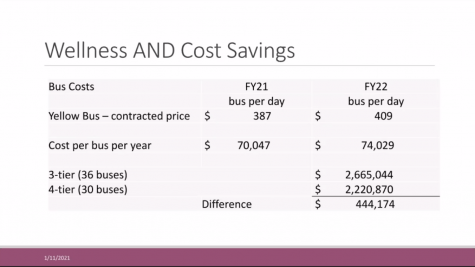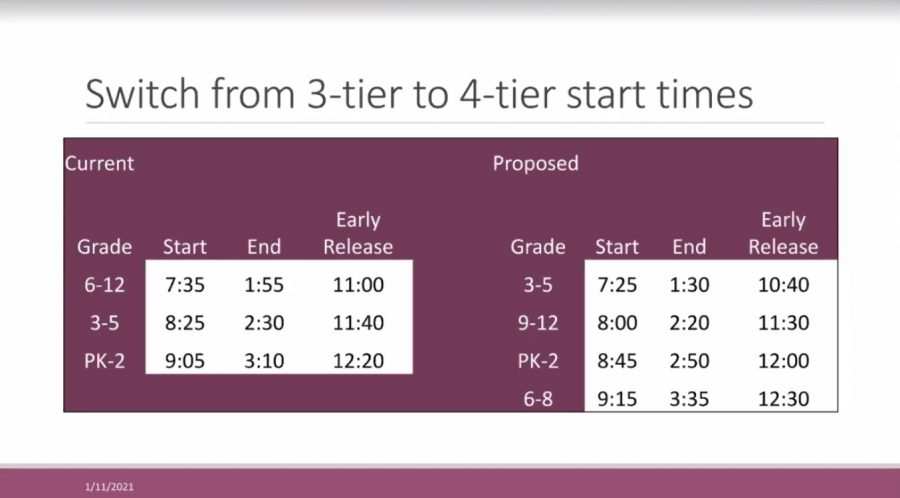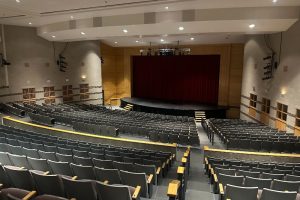Olsen’s plan for start-times incites controversy among parents
New proposed start times
January 13, 2021
Town members and school committee discussed an initial transportation plan during the first budgetary hearing of the year on Monday, January 11. The proposal encompasses different start times for all four educational levels through a cut in busing.
Superintendent Bill Olsen recommended going from a three tier system of busing, where buses will need to make rounds at three different times in the morning and three different times in the afternoon, to a four tier system, where buses will need to make four separate rounds. Thus, all four levels of school, Pre-K to 2, 3 to 5, middle school, and high school, will have different starting and ending times.
Due to the pandemic, the increase of appropriation from last year is 1.4%. For fifteen years in the recent past, the appropriation increased by an average of 3.43% per year, making this year fall short of the average by 2%.
Due to this shortfall, there will have to be more than $1,000,000 worth of cuts in our school system. Going from a three tier system of 36 buses to a four tier system of 30 buses will save Westford Public Schools $444,174. According to Olsen, this cut will ensure the same high quality education for students, as it will save the jobs of eight to ten teachers throughout the district.

“Our core mission is to educate students. Yes, the school bus transportation is important […]. It is my job to provide you, the residents, the best school system we possibly can. That means excellent programs, but it also means excellent staff,” Olsen said.
The proposed school-day timings for the four tier system have grades 3-5 at the start and end earliest, from 7:25 AM to 1:30 PM. Westford Academy’s timings will go from 8:00 AM to 2:20 PM. PreK to 2 will run from 8:45 AM to 2:50 PM. The middle schools will be the latest, from 9:15 AM to 3:35 PM.
The timings were structured to go by the optimal learning times of students at different ages. Middle school and high school students have a later sleep pattern, whereas younger students in the PreK to 5 levels learn better earlier in the day.
“We are proposing everything on the assumption that we will have a normal school year to return to next year. We are looking for these schedules to be very beneficial, not only to our elementary students, but certainly to our adolescents. We think they [the schedules] are sustainable, regardless of in the future whether there is a four tier, three tier, or two tier transportation system,” Olsen said.
Due to the drastic shift in schedule for middle school students, there was question as to how extra-curricular activities and sports will be impacted when running much later than in previous years.
Stony Brook principal Dr. Christopher Chew says that middle school sports will be disrupted, but there aren’t as many sporting events as at WA. Thus, middle school students with away games may be allowed to occasionally be dismissed early to get to their games. As for extracurriculars, according to Chew, they will still be able to run in a normal manner if there is a late bus able to run at 4:30.
“This issue is that in a four tier system, somebody has to go last. I mean the best thing would be if [middle school and high school] stick together, but that doesn’t put us in a four tier system,” Chew said.
Many of the concerns raised during the meeting were related to how working parents would adjust to such a drastic change. In response to this concern, Olsen mentioned the reintroduction of the Before School Early Arrival program for specifically the K-2 and 6-8 grade levels. Under the assumption that school would return to normal in August, Olsen mentioned that the recreation department would most likely provide after-school programs.
Parents were additionally at unease with the earlier start time for grades 3 to 5, as dark mornings pose safety risks for those children at bus stops. Under policy, it states that it is the parents’ responsibility to ensure safety from home to bus stop and vice versa.
“We can’t supervise the children […] It’s the responsibility of families,” Olsen said.
Former school committee member Megan Eckroth stated how the sleep studies, cited during the meeting, mentioned that children progressively sleep later as they get older. Due to this, she believes it doesn’t logically make sense for grades 3-5 to start at 7:35 and then transition to 9:15 for middle school. She would like to see K-2 grades start earliest and high school start the latest to follow the continuum of sleep patterns.
Eckroth also mentioned that several staff members voiced their opinions on social media concerning the middle schools’ time change. She says would like to see a staff survey in addition to the parent survey as she is concerned staff would leave as a result of later start times. Regarding her concern, Olsen said he anticipates having a face-to-face conversation with the staff.
Next, Westford resident and parent Haining Bao highlighted that only seven grades would benefit from later start times, while the other seven would actually start earlier. He feels this would be a trade off with “no significant mental health gain.” Bao acknowledged that there is no perfect solution, but feels saving money from later start times should be the last resort.
Olsen responded saying that there is no difference in focus for grades starting school early as studies show that pre-adolescent students have the same level of focus at 7 A.M. as adolescent students at 8 A.M.
“This suggests that elementary schools may be able to start earlier in the day without negatively affecting student achievement. That does not cover mental health, but I just wanted to clarify that the younger students starting earlier also benefit academically,” Olsen said.
The final question was posed by Westford parent Jamie Holmes, who believes other techniques of saving money should be explored since later start times sacrifice the mental health and scheduling norms of grades K-8 for the benefit of high schoolers. Additionally, she mentioned how appalled she was to discover a plan of this sort is being discussed during the pandemic.
“I think we need to start getting a little more creative with money saving techniques […] Maybe you can make extra money from a school budget by having your before school care at the middle school and after school care at your elementary schools, but [that’s] only taking money out of parents’ pockets [who] are already suffering [due to the pandemic],” Holmes said.
School committee member Gloria Miller acknowledged that money savings will mostly come from bus contracts, not through before and after school programs. Adding on to Miller’s response, Olsen announced that there will be a budget presentation for everyone in town, detailing how money will be generated and used for the school budget.
“We want everyone to understand as clearly as possible how your tax dollars are spent in the Westford public schools,” Olsen said.
Ultimately, there were no decisions made at the meeting. There will be budget hearings every other Monday, where the school committee will unpack details and other aspects of the FY22 budget and start voting the budget.









